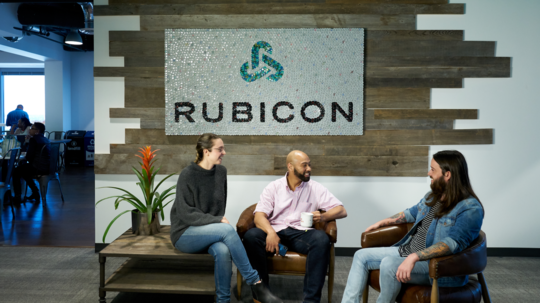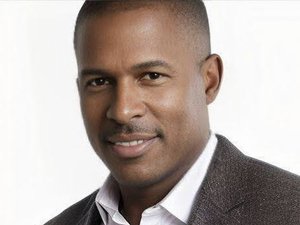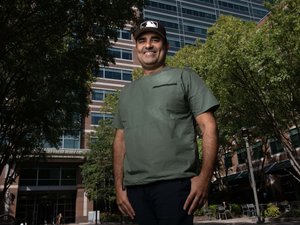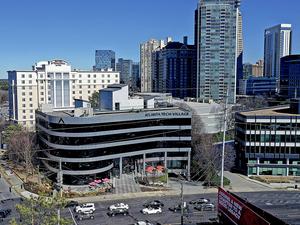
Rubicon Global, one of Atlanta’s few unicorn startups, leads by example, with designs, amenities and policies implemented throughout its office that model the environmental change they ask their customers to match.
Situated on the 18th and 19th floors at Atlanta Plaza, a total of 46,735 square feet is dedicated to the nearly ten-year-old company's mission - to help businesses, municipalities and garbage haulers find solutions for reducing waste and increasing recycling that saves money and the planet. Rubicon, which has been described as the "Uber for Recycling," achieves this by connecting businesses to a network of independent waste and recycling services through its platform.
At the entrance of their Buckhead office, visitors and roughly 235 employees are greeted by Rubicon’s logo constructed out of recycled bottle caps, which serves as a reminder of their mission, according to Senior Vice President of Policy and Strategic Initiatives Mike Allegretti.
“We’re a B Corp, which is a special thing [in that] we’re a company that believes in the power of using business for good. It’s part of our mission, it’s ingrained in our operating agreement,” he said. “Our social mission, what we’re trying to achieve, is a world without landfills, so ultimately building a more circular economy, whether that’s more recycling, more reuse or less waste product."
Certified B Corporations, of which there are only six in Atlanta, are for-profit businesses that have committed to meeting rigorous standards of environmental and social performance, transparency and accountability. (Think of it like a coffee brand that has been certified as 'Fair Trade').
Like its mission, every design choice, furniture piece and accommodation at the office serves a purpose, including its location; Allegretti said Rubicon moved into the Atlanta Plaza in July 2016 because of its proximity to the Lenox MARTA station for employees who commute via public transit.
“You do not even have to walk outside from the train to get into this building and another aspect of being a B Corp, one of the things we’ve chosen to do to fill our B Corp mission is to subsidize public transit,” he said. “I believe around 25 percent of our employee base exclusively uses public transit to get to and from work. For a city like Atlanta, that’s a very big deal.”
In the hallways and gathering spots, Rubicon has foregone the beanbags for lounge seating, wood finishes and intimate lighting. Employees skip paper and pen for marker and windows or wall erase boards, but can still break for a round of fooseball, air hockey or crank out a quick podcast in one of the recording rooms. Along with a number of framed patents, screens showing Smart City haulers out on a job in Atlanta, Columbus and Santa Fe, where its smart cities program is currently operating, line the walls, though Allegretti hopes to hang new art to represent their values in the coming weeks.
Even the conference rooms play homage to the company’s initial beginnings.
“Our conference rooms are all named after horses or farms related to the Kentucky thoroughbred industry,” Allegretti said. “Our company was founded in Louisville and Nate Morris and Marc Spiegel, our co-founders, are Kentuckians, so while the company was moved here early on, and is based here, we wanted to kind of keep a link back to the company’s early founding.”
The cafeteria serves as a hallmark for the company’s efforts and a trial run for their customers, where not a single item goes to waste, according to Vice President of Sustainability David Rachelson. Disposable utensils have been replaced with silverware, mugs and more from the Salvation Army, which Rubicon also has a bin dedicated for employees who’d like to recycle clothing. Staff can drop off cell phones or computers for recycling at a bin in the office or enjoy a cup of joe at the coffee station without worry of creating any waste.
You won’t find a waste bin under any of the desks, but instead separate canisters for recycling, compost, non-traditional recyclables and more in the cafeteria.
“That does two things, one, we’re able to really target education at the point of these bigger bins—people sort better—but it also discourages waste generation in the first place because you actually have to take an extra step from your desk,” Rachelson said.
When asked why the South of all places to implement change, Allegretti said the area gives Rubicon a tremendous competitive edge.
“Atlanta is a world-class city with an exceptionally good quality of life and cost-of-living and so it would make sense if you’re going to be based in the South,” he said.
“But why the South vs. Silicon Valley or New York? Because places like Atlanta and like Louisville are closer to the problems of real world Americans. We feel very strongly about that. So the Rubicon Method, which is one piece of paper which says, ‘Here is how you can actually start to achieve this pie in the sky notion of zero waste,’ those sorts of documents or methodologies are not coming out of places like Silicon Valley. The answer isn’t always, ‘The tech will take care of it.’ The answer is usually, ‘The tech and some common sense will get you to the right answer,’ and I think there’s a lot of common sense in a place like Atlanta.”








